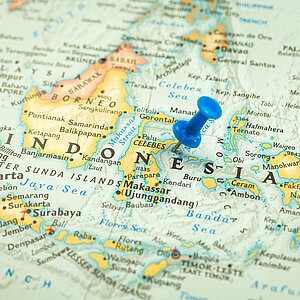Climate and Biodiversity Hub Indonesia
Indonesia is severely affected by climate change impacts and harbours unique biodiversity that is under threat. At the same time, the archipelago is one of the ten largest greenhouse gas emitters in the world and plays an important role in achieving the Paris Climate Agreement and the Convention on Biological Diversity (CBD). The project supports the Indonesian government in mainstreaming its climate and biodiversity policies into national development planning. To this end, it trains staff of relevant line ministries and strengthens cooperation with civil society and academia. The project also advises on improving competencies for transparent reporting, financial resource mobilisation and knowledge exchange with the international community. As an IKI interface project, it is responsible for networking and communication between the implementing organisations of IKI projects in Indonesia.
- Countries
- Indonesia
- IKI funding
- 10,000,000.00 €
- Duration
- 05/2021 till 04/2026
- Status
- open
- Implementing organisation
- Deutsche Gesellschaft für Internationale Zusammenarbeit (GIZ) GmbH
- Political Partner
-
- Ministry of Environment and Forestry (KLHK) - Indonesia
- State Ministry of National Development Planning (BAPPENAS) - Indonesia
- Implementing Partner
-
- Ministry of Environment and Forestry (KLHK) - Indonesia
- State Ministry of National Development Planning (BAPPENAS) - Indonesia
- Online
State of implementation/results
- The project was officially launched in October 2021 and has been supporting its partners in their climate change and biodiversity policies and actions.
- Some of the supported processes include:
- Near Zero Emission Waste (NZEW) 2050 strategy, with milestones to reach near zero emission in the waste sector.
- Submission of the Adaptation Communication (ADCOM) to the United Nations Framework Convention on Climate Change (UNFCCC), providing Indonesia’s climate change assessment.
- Mid-term evaluation of the medium-term development plan 2020-2024 to track progress of the implementation of the low carbon development.
- Inclusion of climate change and biodiversity policies into the newly formulated development strategies in the medium (2025-2030) and long terms (2025-2045), by facilitating background studies and modelling systems relevant for an evidence-based decision-making process.
- Introduction of the Biodiversity Management Index as part of the Development Indicators in the Long-term National Development Plan 2025-2045, which secures a regular monitoring on performance.
- Preparation of the National Biodiversity Strategies and Action Plan (NBSAP) 2025-2030.
- Enhancing functionality of the digital platform hosted at the Ministry of National Development Planning (BAPPENAS) that allows the projection of green-house gas (GHG) emissions for planning decisions. New features improve calculations and reporting at the sub-national level.
- Strengthening the capacities of partners and relevant stakeholders in technical areas to optimize the governance of biodiversity and climate change.
- Concrete Progress to support Indonesia to achieve its commitments at international level is reflected in:
- The submission of the Enhanced Nationally Determined Contribution (ENDC) to UNFCCC in September 2022, with increased GHG emission reduction targets from 29% to 31.89% (unconditional) and from 41% to 43.20% (conditional).
- Preparation of the NDC 3.0, including scenarios aligned with the Paris Agreement on Climate Change.
- The submission of the Indonesia Biodiversity Strategy and Action Plans (IBSAP) 2025-2030, in alignment with the Global Biodiversity Framework (GBF). This includes the establishment of a Monitoring System for IBSAP and the preparation of an Investment Framework for the Sustainable Management of Biodiversity Conservation.
- Promotion of knowledge exchange and synergies among organizations implementing IKI-funded projects in Indonesia through frequent formats and digital communication.
- High-level dialogues between Indonesian and German Ministries take place regularly, fostering mutual understanding on priorities and cooperation.
Latest Update:
04/2025
Further links
Project relations
Legend:
The link has been copied to the clipboard
















